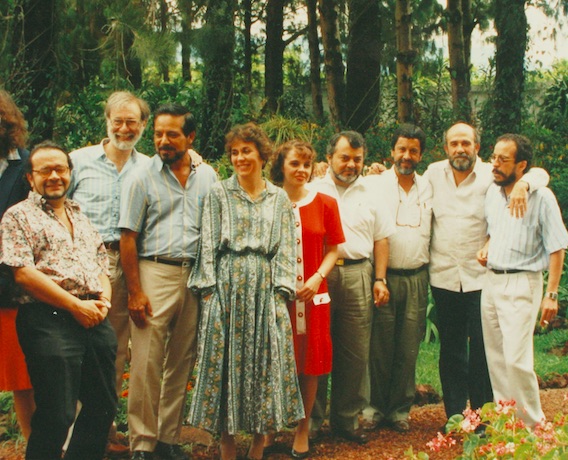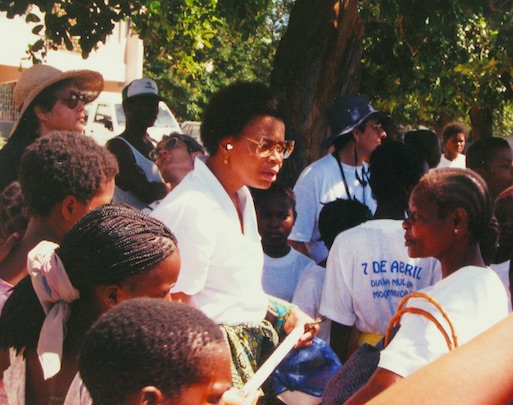Stories
National culture of peace programmes
Missions for the culture of peace
The failure of the culture of peace programme
Brothers for Peace
* * *
The following descriptions of the national culture of peace programmes in El Salvador and Mozambique are drawn from my online Early History of the Culture of Peace. The programmes were based on our approach of Cross-conflict participation
The initial pilot project for a culture of peace, launched in 1993 in El Salvador, was evaluated in the First International Forum on the Culture of Peace held a year later in San Salvador 16-18 February 1994. I was told by those who attended that it was a remarkable political event in which the conflicts of those who had been enemies during the long civil war were constantly revisited, but effectively channeled into constructive engagement. The final report included a valuable summary of the principles for a culture of peace (reprinted in the culture of peace monograph).
Under the effective direction of Francisco Lacayo, the El Salvador Culture of Peace Programme became a successful model of what can be accomplished. Along with Mirta Lourenco, who was responsible for the project at headquarters, we published a report from the project in 1996 in the International Journal of Peace Studies, which is available on line. A formal internal evaluation of the project, carried out for UNESCO by Ansgar Eusner in April 1998, confirmed the conclusions provided in the published report. When the UN peacekeeping forces withdrew from El Salvador, a ceremony was held at UN headquarters in San Salvador to pass the responsibility for peace to the culture of peace programme.
However, in the long run, the international funding for culture of peace in El Salvador was not continued, and the programme was discontinued by the end of the decade.

The team of the culture of peace unit for El Salvador which met in Costa Rica in 1993
From left to right, Gonzalo Abad, myself and Franciso Lacayo.
Franciso was like a brother to me, as we shared our political views, our poetry and our friendship.
Along with Luis Tiburcio from UNESCO headquarters, I went on mission to Mozambique at the end of September, 1993, and came back with a proposal for a pilot project that would be launched as part of the United Nations demobilization project (ONUMOZ). The mission was received and greatly supported by the Mozambique National Commission for UNESCO. Graca Machel, its President, assigned her education officer, Mr Noel Chicuecue, to work with me. Thanks to the extensive experience and wide contacts he had gained as a provincial education director, we were able to develop the initial lines of a project very quickly, which was submitted to the Director-General on 15 October 1993 along with my mission report.
In response to the recommendation in my mission report, the Director-General made available $120,000 from the Social Science budget to be used for the Mozambique pilot project, and I went back with that money in my mission to Mozambique of April 1994 and followed up with another mission in October 1994.
The project in Mozambique did not develop to the same extent as the project in El Salvador. An elaborate project proposal was prepared for funding (original full version dated October 1994, later revised in February 1995). Although funding was never obtained for the project, Noel Chicuecue, who was hired as the culture of peace officer in Mozambique, went on to accomplish many important initiatives. He organized a parliamentary visit to neighboring parliaments in Southern Africa (initiated by Director-General and me in Paris) which broke the deadlock following the initial national elections when the rival FRELIMO and RENAMO legislatures initially refused to work together. Also, Noel helped organize several regional meetings on a culture of peace hosted by Mozambique, including one in September 1997 for which I had the responsibility at headquarters. Another conference planned for Mozambique in 1996 on demobilized soldiers had also been under my responsibility but was canceled at the last minute by the government.

Graca Machel speaking to young women after a rally for the women's movement in Mozambique in 1994.
In my meetings with her to launch the National Culture of Peace Programme, I felt I was in the presence of the most impressive person I had ever met in my life! At that time she was a national hero of Mozambique as the widow of Samora Machel, the revolutionary leader and founder of modern Mozambique, and later she would become the wife and collaborator of Nelson Mandela.
I became invested personally in the El Salvador and Mozambique programs, to the extent that I was criticized by some UNESCO bureaucrats. I expressed this in poems: Peace is a Tree and From El Salvador And Noel Chicuecue and Francisco Lacayo became my brothers.
 |
Stages
1986-1992
Fall of Soviet Empire
1992-1997
UNESCO Culture of Peace Programme